
OVERVIEW
MANAGEMENT
PERFORMANCE
POSSIBILITIES
CAPITALS
ACTIVITIES
ACTORS
BURGESS
|
US POLITICS
DEMOCRACY IN PERIL ... NOT A PRIORITY Voters See Democracy in Peril, but Saving It Isn’t a Priority ... A New York Times/Siena College poll found that other problems have seized voters’ focus — even as many do not trust this year’s election results and are open to anti-democratic candidates. 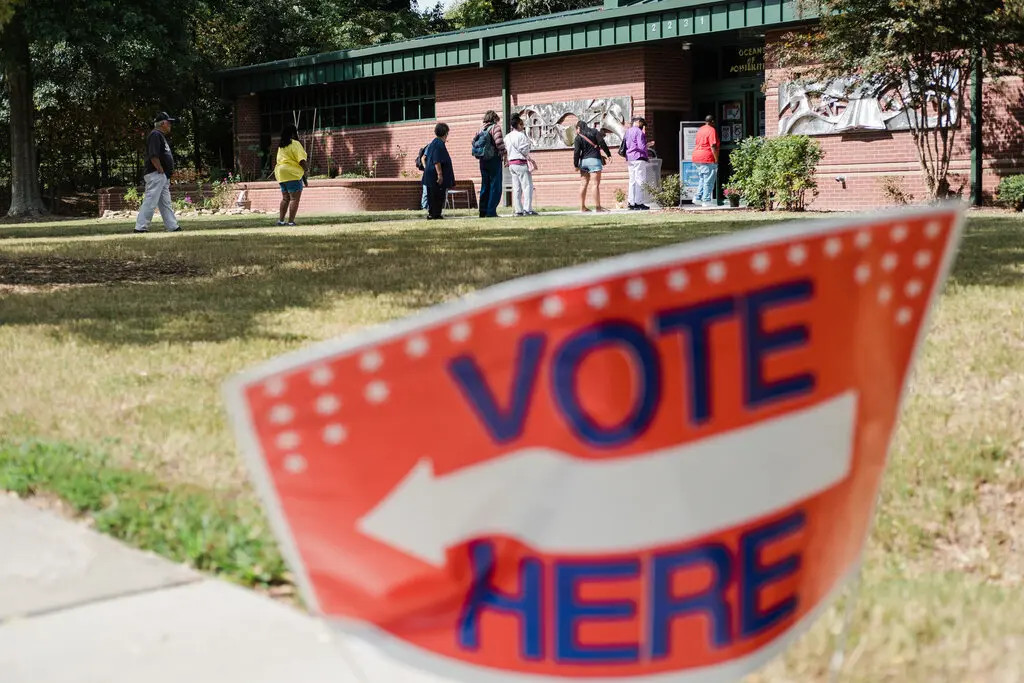
Voters in Atlanta casting early ballots this month. Twenty-eight percent of voters nationwide said they had little to no faith in the accuracy of this year’s elections, a New York Times/Siena College poll found.Credit...Gabriela Bhaskar for The New York Times Original article: https://www.nytimes.com/2022/10/18/us/politics/midterm-election-voters-democracy-poll.html Peter Burgess COMMENTARY After reading this article, I am more confused than I was before. Whether or not, I am confused is not particularly important ... but if the voters are as confused, then it starts to be important. I am concerned that the media has an unfortunate process for prioritising stories which results in the general public getting a lot of information that is somewhat 'fashionable' but in reality not so important. Bottom line ... I am concerned that there are relatively few people who write and get published who actually have a decent grasp on the really big issues that we all are going to have to face. The conversation ... the dialog ... quickly migrates to the headline grabbing nonsense that does little or nothng better to inform the electorate. It is sad that everyone is communicating to the electorate in a mad race to the bottom. I found the following pretty much summarizing where I am, and where most people are: “What the issue is, where you’re seeing the anger, is the shrinkage of the middle class,” said Jeffrey Valfer, 49, a Democrat from Patchogue, N.Y. He added: “Once you delve into really addressing whatever we need to do to rebuild the middle class of this country, then that should fix a lot of the issues that you’re seeing. It should fix a lot of concerns about our democracy.”... but there is little focus on getting to grips with this challenge. In fact, I am of the view that this is the last thing that a lot of people in politics want to address in a serious way. For many this is not in their political interest or financial interest or their competence. So called 'kitchen table issues' have been successfully messaged by Republicans with no effective action and follow through, while Democrats who actually have pretty impressive policies and plans ... not to mention considerable legislative accomplishment, but no idea whatsoever about how to message this in an easily understandable way. Peter Burgess | ||
|
Voters See Democracy in Peril, but Saving It Isn’t a Priority
A New York Times/Siena College poll found that other problems have seized voters’ focus — even as many do not trust this year’s election results and are open to anti-democratic candidates. By Nick Corasaniti, Michael C. Bender, Ruth Igielnik and Kristen Bayrakdarian Oct. 18, 2022 Voters overwhelmingly believe American democracy is under threat, but seem remarkably apathetic about that danger, with few calling it the nation’s most pressing problem, according to a New York Times/Siena College poll. In fact, more than a third of independent voters and a smaller but noteworthy contingent of Democrats said they were open to supporting candidates who reject the legitimacy of the 2020 election, as they assigned greater urgency to their concerns about the economy than to fears about the fate of the country’s political system. 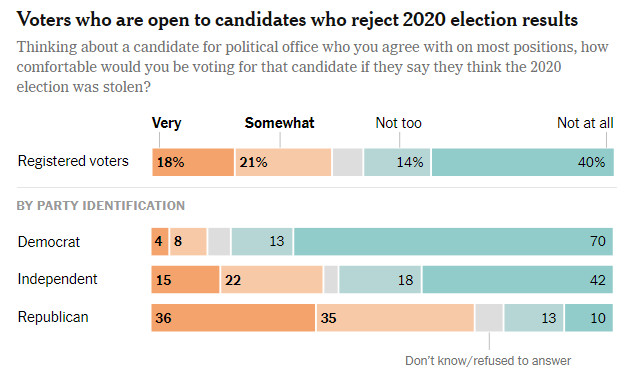
Based on a New York Times/Siena College poll of 792 registered voters nationwide from Oct. 9 to 12, 2022. Party identification is self-identified and does not include voters who lean toward one party; independents include only self-identified independents.By Ashley Wu The doubts about elections that have infected American politics since the 2020 contest show every sign of persisting well into the future, the poll suggested: Twenty-eight percent of all voters, including 41 percent of Republicans, said they had little to no faith in the accuracy of this year’s midterm elections. Political disagreements appear to be seeping into the fabric of everyday life. Fourteen percent of voters said political views revealed a lot about whether someone is a good person, while 34 percent said it revealed a little. Nearly one in five said political disagreements had hurt relationships with friends or family. “I do agree that the biggest threat is survival of our democracy, but it’s the divisiveness that is creating this threat,” said Ben Johnson, 33, a filmmaker from New Orleans and a Democrat. “It feels like on both sides, people aren’t agreeing on facts anymore. We can’t meet in the middle if we can’t agree on simple facts. You’re not going to be able to move forward and continue as a country if you can’t agree on facts.” The poll showed that voters filtered their faith in democracy through a deeply partisan lens. A majority of voters in both parties identified the opposing party as a “major threat to democracy.” Most Republicans said the dangers included President Biden, the mainstream media, the federal government and voting by mail. Most Democrats named Donald J. Trump, while large shares of the party’s voters also said the Supreme Court and the Electoral College were threats to democracy. Seventy-one percent of all voters said democracy was at risk — but just 7 percent identified that as the most important problem facing the country. These ostensibly conflicting views — that voters could be so deeply suspicious of one another and of the bedrock institutions of American democracy, while also expressing little urgency to address those concerns — may in part reflect longstanding frustrations and cynicism toward government. 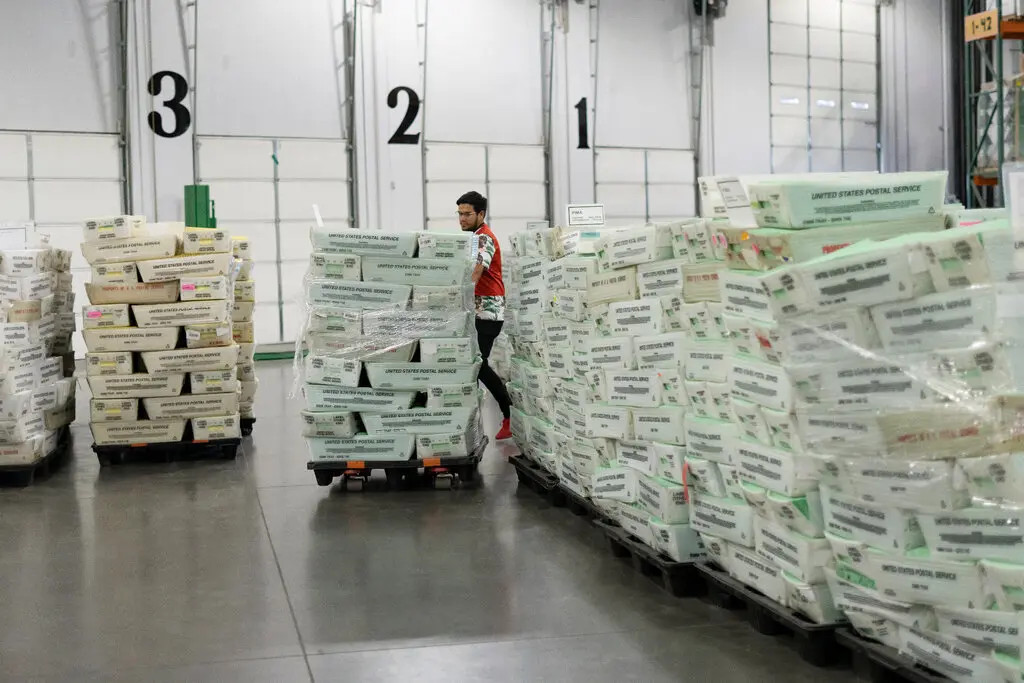
Newly printed mail-in ballots in Phoenix. Fifty-five percent of Republican voters called mail-in voting a major threat to democracy, the poll found.Credit...Rebecca Noble for The New York Times Still, among voters who saw democracy as under threat, the vast majority, 81 percent, thought the country could fix the problem by using existing laws and institutions, rather than by going “outside the law,” according to the poll. Those who said violence would be necessary were a small minority. “If we’re just talking about freedom, having freedom, and that we get to have a say in our choices, then I think we still have that,” said Audra Janes, 37, a Republican from Garnavillo, Iowa. She added, “I think that we need to stop trying to rewrite the Constitution and just reread it.” Overall, voters’ broader frustration with a political system that many view as dangerously divided and corrupt has left them pessimistic that the country is capable of coming together to solve its problems, no matter which party wins in November. How nine voters characterized the threat to democracy What one or two words do you think summarizes the current threat to democracy? 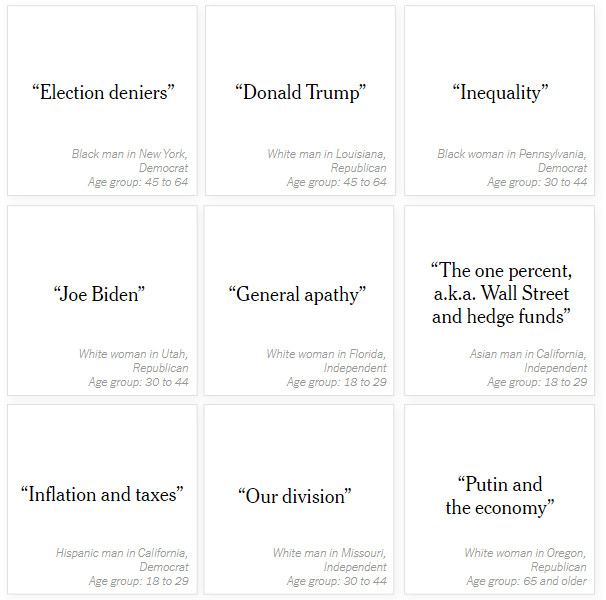
Based on a New York Times/Siena College poll of 792 registered voters nationwide from Oct. 9 to 12, 2022. Responses have been chosen from a subset of voters who say democracy is under threat. White and Black voters include non-Hispanic respondents who report that they are of only one race. Hispanic voters are of any race.By Ashley Wu The poll’s findings reinforce the idea that for many Americans, this year’s midterm elections will be largely defined by rising inflation and other economic woes — leaving threats to the country’s democratic institutions lurking in the back of voters’ minds. The deep distrust of elections, especially among Republicans, points to lingering fallout from the lies and conspiracy theories surrounding the 2020 election that have been fueled by Mr. Trump and his supporters. Seventy-one percent of Republicans said they would be comfortable voting for a candidate who thought that year’s election was stolen, as did 37 percent of independent voters and a notable 12 percent of Democrats. Even among voters who think Mr. Biden won legitimately, 19 percent were comfortable casting a ballot for a candidate who believed the election was stolen. That number included 10 percent of Democrats, 22 percent of independents and 43 percent of Republicans who believed the 2020 election was fair. Voters also signaled a bipartisan willingness to support a president who goes “outside of existing rules”: A third, including similar shares in both parties, said presidents should do what they think is best, even if it might flout the rules. Twenty-six percent of voters said they had heard about “2000 Mules,” a widely debunked movie purporting to show that absentee ballots were “stuffed” in drop boxes to help Democrats in 2020. Of those who had heard about the film, 34 percent found it to be believable, and 45 percent said they did not know enough to say. Just 2 percent of Republicans who had heard about the movie found it not believable. Only 4 percent of all voters said they found QAnon conspiracy theories, which make bizarre false claims about a satanic cult of Democrats, to be believable, but the vast majority of Republicans, 73 percent, said they did not know enough about the theories to say, rather than rejecting them outright. 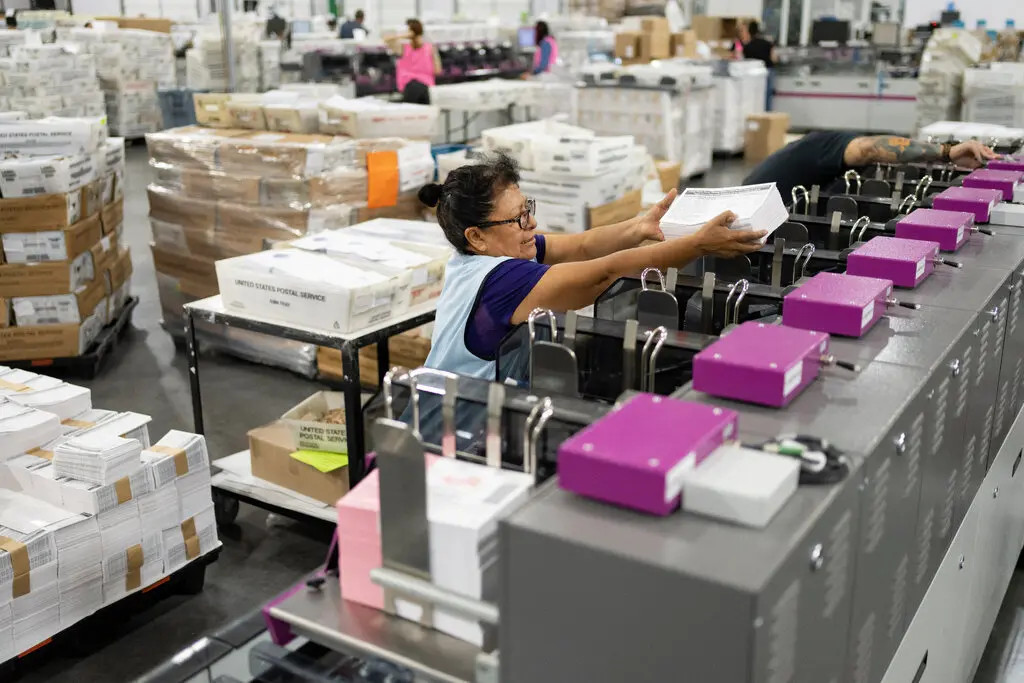
Mail ballots being prepared in Phoenix. “I just don’t believe in the people who tally it,” one Republican voter said of election officials.Credit...Rebecca Noble for The New York Times Days after early voting began, about four in 10 Republican voters said they did not trust that the 2022 results would be accurate — even though polls show their party is favored to win control of the House and could also take back the Senate. Thirteen percent of Democrats and 26 percent of independents shared a similar mistrust of this year’s eventual results. Republican voters’ suspicions about the electoral process were underscored by their deep mistrust of mail ballots. While 72 percent of Democrats and 48 percent of independents said voting by mail presented no threat at all to democracy, 55 percent of Republicans called the practice a major danger. “I just don’t believe in the people who tally it,” Teresa Fogt, 61, a Republican from Sidney, Ohio, said of election officials, arguing that the 2020 election was rigged and that Democrats would try to steal other offices this year. She added: “It’s hard for me to believe that more of America’s citizens would vote for Joe Biden than Donald Trump. Joe Biden is an idiot. I don’t know him personally, and he probably is a good person, but as a president, he’s an idiot.” Democratic voters cited the economy and inflation as their top concerns, prioritizing them over democracy and other issues like abortion access. Some, however, viewed the problems as going hand in hand. “What the issue is, where you’re seeing the anger, is the shrinkage of the middle class,” said Jeffrey Valfer, 49, a Democrat from Patchogue, N.Y. He added: “Once you delve into really addressing whatever we need to do to rebuild the middle class of this country, then that should fix a lot of the issues that you’re seeing. It should fix a lot of concerns about our democracy.” Independent voters were far more worried about issues other than democracy, and some were willing to look past candidates’ election-denying stances if their views aligned on other policies. “I don’t believe that their opinion on whether or not the election was quote unquote stolen is important,” said Michael Sprang, 47, a senior electronics technician and independent from Jackson, Mich. “I’m far more concerned about their stance on policies that actually matter.” He added: “I’m more concerned about how you feel about the Second Amendment. How do you feel about the First Amendment? How do you feel about the state of the economy?” The Times/Siena survey of 792 registered voters nationwide was conducted by telephone using live operators from Oct. 9 to Oct. 12, 2022. The margin of sampling error among registered voters is plus or minus 4.0 percentage points. The topline is available here, and the cross-tabs and methodology are available here. Nick Corasaniti covers national politics. He was one of the lead reporters covering Donald Trump's campaign for president in 2016 and has been writing about presidential, congressional, gubernatorial and mayoral campaigns for The Times since 2011. @NYTnickc • Facebook Michael C. Bender is a political correspondent and the author of “Frankly, We Did Win This Election: The Inside Story of How Trump Lost.” @MichaelCBender Kristen Bayrakdarian is a news assistant for the Business desk. @kabayrak9 A version of this article appears in print on Oct. 18, 2022, Section A, Page 1 of the New York edition with the headline: Most Voters Say U.S. Democracy Is Under Threat. ------------------------------------------------------- “Election deniers” Black man in New York, Democrat Age group: 45 to 64 “Donald Trump” White man in Louisiana, Republican Age group: 45 to 64 “Inequality” Black woman in Pennsylvania, Democrat Age group: 30 to 44 “Joe Biden” White woman in Utah, Republican Age group: 30 to 44 “General apathy” White woman in Florida, Independent Age group: 18 to 29 “The one percent, a.k.a. Wall Street and hedge funds” Asian man in California, Independent Age group: 18 to 29 “Putin and the economy” Hispanic man in California, Democrat Age group: 18 to 29 “Inflation and taxes” Independent Age group: 30 to 44 White man in Missouri, “Our division” White woman in Oregon, Republican Age group: 65 and older ------------------------------------------------------- Democracy Challenged: A Look at the Historic Test on Democratic Norms Key coverage on the challenges to democracy:
| The text being discussed is available at | https://www.nytimes.com/2022/10/18/us/politics/midterm-election-voters-democracy-poll.html and |